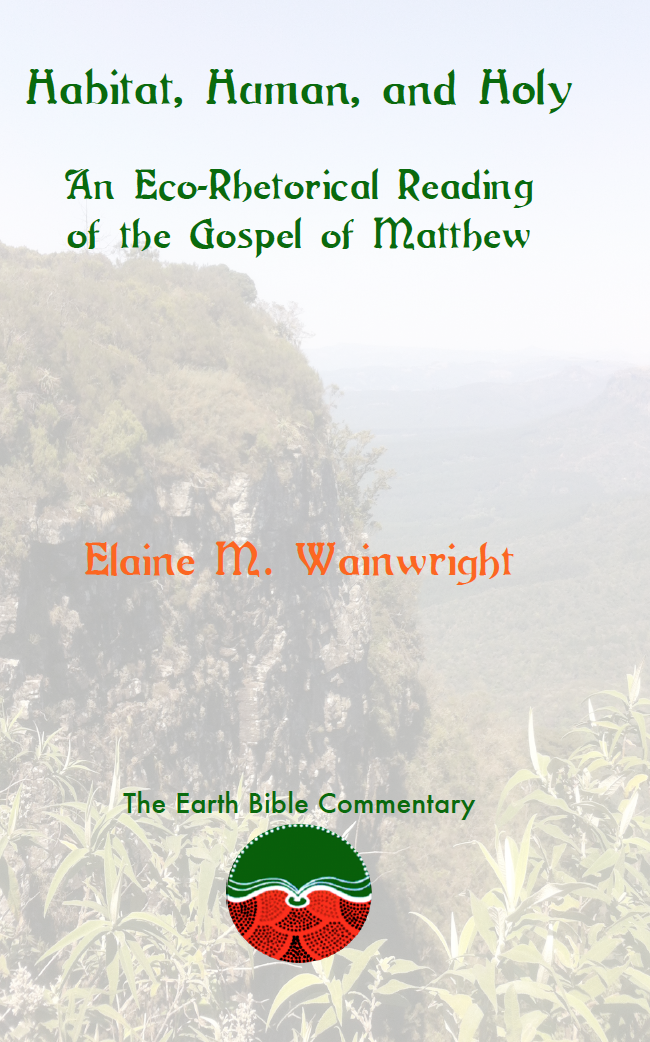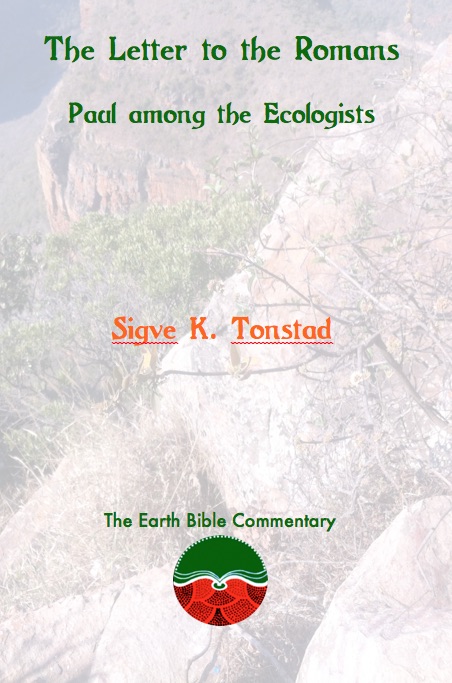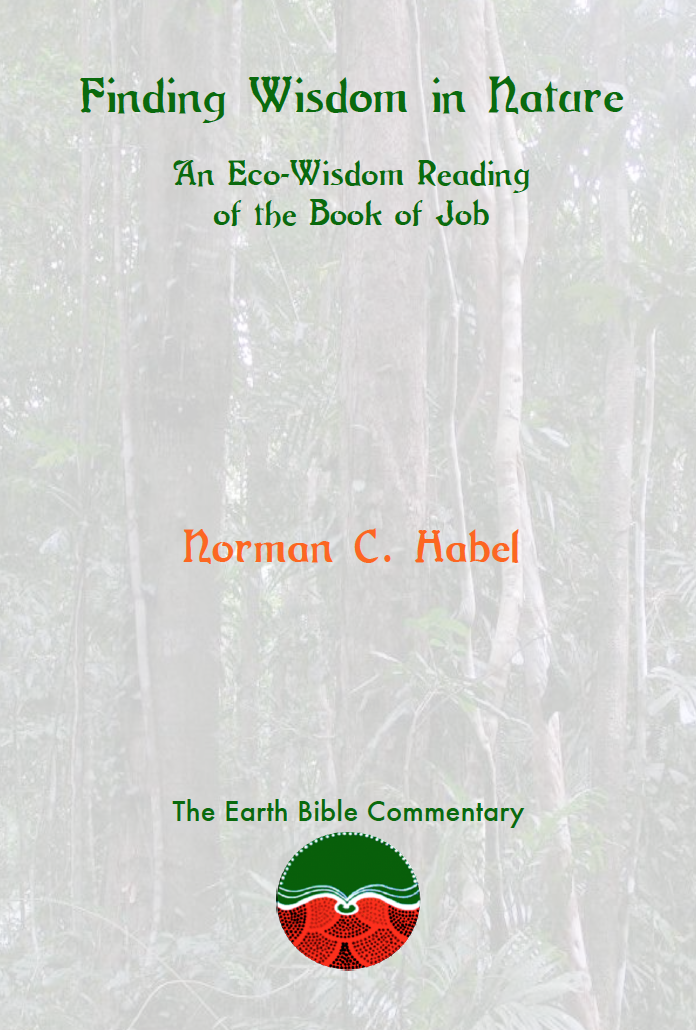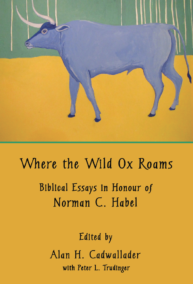Habitat, Human, and Holy: An Eco-Rhetorical Reading of the Gospel of Matthew
Published: Sep 2017
Price range: £20.00 through £50.00
Texts are rhetorical; they have an effect; they shape the mind and emotions of the readers who engage the text. Readers, in their turn, attend to the rhetoric of a text through the interpretative lens they bring to their reading of the text at the same time as they are being shaped by its rhetoric. Elaine Wainwright's eco-rhetorical reading of the Gospel of Matthew explores this interplay of rhetoric and perspective.
An ecological perspective or hermeneutic is relatively new within biblical studies. It continues to be shaped and formed. Lorraine Code's call to 'ecological thinking' as a new 'social imaginary' informs the ecological perspective that Wainwright brings to this particular reading of the Gospel of Matthew. It is attentive to the interrelationships of all Earth constituents, and functions as a lens through which one can read the entire Gospel of Matthew. Such a perspective functions well with the particular rhetorical approach that guides this ecological reading. This approach is attentive to a complex weaving of material and 'other-than-human' as well as human features into the fabric of the text: hence the title Habitat, Human and Holy. It is their interaction in the text that constructs its rhetoric and it is this that engages the ecological reader.
The story of Jesus, Emmanu-el, as it unfolds in the carefully structured Gospel of Matthew, is here read using an ecological hermeneutic and a rhetorical way of reading. Significant new insights emerge at each step of the way.
Habitat, Human, and Holy: An Eco-Rhetorical Reading of the Gospel of Matthew
Price range: £20.00 through £50.00
Texts are rhetorical; they have an effect; they shape the mind and emotions of the readers who engage the text. Readers, in their turn, attend to the rhetoric of a text through the interpretative lens they bring to their reading of the text at the same time as they are being shaped by its rhetoric. Elaine Wainwright's eco-rhetorical reading of the Gospel of Matthew explores this interplay of rhetoric and perspective.
An ecological perspective or hermeneutic is relatively new within biblical studies. It continues to be shaped and formed. Lorraine Code's call to 'ecological thinking' as a new 'social imaginary' informs the ecological perspective that Wainwright brings to this particular reading of the Gospel of Matthew. It is attentive to the interrelationships of all Earth constituents, and functions as a lens through which one can read the entire Gospel of Matthew. Such a perspective functions well with the particular rhetorical approach that guides this ecological reading. This approach is attentive to a complex weaving of material and 'other-than-human' as well as human features into the fabric of the text: hence the title Habitat, Human and Holy. It is their interaction in the text that constructs its rhetoric and it is this that engages the ecological reader.
The story of Jesus, Emmanu-el, as it unfolds in the carefully structured Gospel of Matthew, is here read using an ecological hermeneutic and a rhetorical way of reading. Significant new insights emerge at each step of the way.
The Letter to the Romans: Paul among the Ecologists
Published: Sep 2017
Price range: £23.00 through £60.00
'What God has joined together, let no one put asunder' is a motto for this commentary. Against a prevailing theological tradition that God's compassion is for human beings only and not also for non-human creation and the earth, Tonstad raises his voice in protest. The 'sundering' omissions are so monumental that only a renewed reading of Romans from the ground up can hope to undo them.
If we read Romans through the eyes of Tonstad, Paul will be found to be speaking about the faithfulness of Christ and not only about faith in Christ; he will describe sin in societal terms and not only as a problem of individuals; his enigmatic 'I' in Romans 7 will tell the story of Eve and not only rehash his own biography; and Paul will give voice to non-human creation and the earth to a degree that is elsewhere heard in the Bible only in the Old Testament and, of course, hardly ever in the pulpit or the seminary.
The theology of Romans will turn out to be an inclusive theology of divine compassion rather than a theology of divine sovereignty, arbitrarily exercised. On the theological foundation of compassion, Paul outlines an ethical vision of compassion in human community, with regard to citizenship and government, and in the mixed fellowship of Jews and Gentiles in the house churches in Rome. Paul's ecological bona fides are inseparable from his theological vision and not an imposition from without; his call to mercy blends with the best and most urgent sentiments of contemporary ecologists.
In the striking reciprocity between theology and ecology in Romans, Paul puts on display what God has joined together, and, better still, what God has done to join together all that is asunder.
The Letter to the Romans: Paul among the Ecologists
Price range: £23.00 through £60.00
'What God has joined together, let no one put asunder' is a motto for this commentary. Against a prevailing theological tradition that God's compassion is for human beings only and not also for non-human creation and the earth, Tonstad raises his voice in protest. The 'sundering' omissions are so monumental that only a renewed reading of Romans from the ground up can hope to undo them.
If we read Romans through the eyes of Tonstad, Paul will be found to be speaking about the faithfulness of Christ and not only about faith in Christ; he will describe sin in societal terms and not only as a problem of individuals; his enigmatic 'I' in Romans 7 will tell the story of Eve and not only rehash his own biography; and Paul will give voice to non-human creation and the earth to a degree that is elsewhere heard in the Bible only in the Old Testament and, of course, hardly ever in the pulpit or the seminary.
The theology of Romans will turn out to be an inclusive theology of divine compassion rather than a theology of divine sovereignty, arbitrarily exercised. On the theological foundation of compassion, Paul outlines an ethical vision of compassion in human community, with regard to citizenship and government, and in the mixed fellowship of Jews and Gentiles in the house churches in Rome. Paul's ecological bona fides are inseparable from his theological vision and not an imposition from without; his call to mercy blends with the best and most urgent sentiments of contemporary ecologists.
In the striking reciprocity between theology and ecology in Romans, Paul puts on display what God has joined together, and, better still, what God has done to join together all that is asunder.
Voices of the Wilderness: An Ecological Reading of the Book of Numbers
Published: Sep 2015
£50.00
In the book of Numbers, the people of Israel are journeying to the so-called Promised Land, the land that flows with milk and honey. Getting there, though, takes them through another place, known to modern readers as 'the wilderness'. This setting gives the book its traditional title, In the Wilderness, and invites a reading of the material from the perspective of that arid and desolate habitat. This explicit identification of a biblical book with a place makes Numbers unique among the canonical books. Yet the wilderness is not a single place. It is a place of remarkable variety and surprising subtlety. Ultimately, the story is one of discontent: the wilderness is rejected as a place, with the promised land that lies ahead seen as a true home, the land of milk and honey, as contrasted with the meagre fare of the wilderness soils.
Despite this clear identification with place, Numbers has remained hitherto almost unexplored from the perspective of ecological hermeneutics. Rees attempts to fill this gap, exploring the ways in which the wilderness is rejected in the biblical book and reclaiming its voices. The soils of the wilderness, the foods of the wilderness, the animals of the wilderness, the waters of the wilderness, each rejected in the narrative at various points, are here foregrounded in order to identify the anthropocentrism at the heart of the story. What unfolds, from the opening narrative of the census onward to the final adjustments to land inheritance, is a near complete disregard in Numbers for the non-human creation.
Voices of the Wilderness: An Ecological Reading of the Book of Numbers
£50.00
In the book of Numbers, the people of Israel are journeying to the so-called Promised Land, the land that flows with milk and honey. Getting there, though, takes them through another place, known to modern readers as 'the wilderness'. This setting gives the book its traditional title, In the Wilderness, and invites a reading of the material from the perspective of that arid and desolate habitat. This explicit identification of a biblical book with a place makes Numbers unique among the canonical books. Yet the wilderness is not a single place. It is a place of remarkable variety and surprising subtlety. Ultimately, the story is one of discontent: the wilderness is rejected as a place, with the promised land that lies ahead seen as a true home, the land of milk and honey, as contrasted with the meagre fare of the wilderness soils.
Despite this clear identification with place, Numbers has remained hitherto almost unexplored from the perspective of ecological hermeneutics. Rees attempts to fill this gap, exploring the ways in which the wilderness is rejected in the biblical book and reclaiming its voices. The soils of the wilderness, the foods of the wilderness, the animals of the wilderness, the waters of the wilderness, each rejected in the narrative at various points, are here foregrounded in order to identify the anthropocentrism at the heart of the story. What unfolds, from the opening narrative of the census onward to the final adjustments to land inheritance, is a near complete disregard in Numbers for the non-human creation.
Deuteronomy and Environmental Amnesia
Published: Sep 2014
£45.00
Modern Westerners suffer from environmental amnesia, our failure to remember properly our intimate connections to the places in our lives and to the other inhabitants of these places, both human and non-human. Although environmental amnesia may be the underlying diagnosis of our contemporary ecological problems, in Deuteronomy and Environmental Amnesia Raymond Person argues that environmental amnesia has roots in ancient Mesopotamia, the cradle of civilization, and that ancient forms of environmental amnesia are evident in the book of Deuteronomy.
Raymond Person combines the ecological hermeneutics of the Earth Bible project for the first time with an emerging approach in environmental philosophy —that is, environmental hermeneutics which draws significantly from the works of Heidegger, Gadamer, Habermas and Ricoeur. As he explores the presence of ancient forms of environmental amnesia in Deuteronomy, he draws extensively from other approaches to the ancient Near East and the Bible that emphasize the interactions between material culture and text and that take seriously the Other as portrayed in the Bible, especially household archaeology, zooarchaeology, feminist approaches, and postcolonial approaches. His analysis discovers not only forms of environmental amnesia that the Deuteronomic school suffered from and promoted ideologically, but also partial remedies for forms of ancient environmental amnesia in some of the Deuteronomic legislation. His reflection on environmental amnesia and its partial remedies in the text of Deuteronomy provides insights into our modern forms of environmental amnesia and how we may begin to lessen its effects on the Earth community.
Between the introduction and conclusion, the volume contains two parts. The first part consists of chapters on how environmental amnesia exists in various themes in Deuteronomy: the family household, land versus wilderness, Israel versus the nations, clean versus unclean animals, and urban versus rural. The second part is somewhat more like a traditional commentary, focusing on themes in selected passages, including herem in Deut. 7.1-26, the sabbath year in Deut. 15.1-18, war in Deut. 20.1-20, first-fruits and the third-year tithe in Deut. 26.1-19, and eschatology in Deut. 28.1-68 and 30.1-20.
Deuteronomy and Environmental Amnesia
£45.00
Modern Westerners suffer from environmental amnesia, our failure to remember properly our intimate connections to the places in our lives and to the other inhabitants of these places, both human and non-human. Although environmental amnesia may be the underlying diagnosis of our contemporary ecological problems, in Deuteronomy and Environmental Amnesia Raymond Person argues that environmental amnesia has roots in ancient Mesopotamia, the cradle of civilization, and that ancient forms of environmental amnesia are evident in the book of Deuteronomy.
Raymond Person combines the ecological hermeneutics of the Earth Bible project for the first time with an emerging approach in environmental philosophy —that is, environmental hermeneutics which draws significantly from the works of Heidegger, Gadamer, Habermas and Ricoeur. As he explores the presence of ancient forms of environmental amnesia in Deuteronomy, he draws extensively from other approaches to the ancient Near East and the Bible that emphasize the interactions between material culture and text and that take seriously the Other as portrayed in the Bible, especially household archaeology, zooarchaeology, feminist approaches, and postcolonial approaches. His analysis discovers not only forms of environmental amnesia that the Deuteronomic school suffered from and promoted ideologically, but also partial remedies for forms of ancient environmental amnesia in some of the Deuteronomic legislation. His reflection on environmental amnesia and its partial remedies in the text of Deuteronomy provides insights into our modern forms of environmental amnesia and how we may begin to lessen its effects on the Earth community.
Between the introduction and conclusion, the volume contains two parts. The first part consists of chapters on how environmental amnesia exists in various themes in Deuteronomy: the family household, land versus wilderness, Israel versus the nations, clean versus unclean animals, and urban versus rural. The second part is somewhat more like a traditional commentary, focusing on themes in selected passages, including herem in Deut. 7.1-26, the sabbath year in Deut. 15.1-18, war in Deut. 20.1-20, first-fruits and the third-year tithe in Deut. 26.1-19, and eschatology in Deut. 28.1-68 and 30.1-20.
Finding Wisdom in Nature: An Eco-Wisdom Reading of the Book of Job
Published: Sep 2014
£40.00
Wisdom, where can she be found?' This question, at the core of Job 28, is arguably the central question also of the entire book of Job.
Where is Wisdom found in Job 28? Habel's answer may be surprising: in the domains and forces of nature, in the ecosystems of the cosmos! And who employs the 'scientific approach' of the ancient Wisdom School to discern this Wisdom? A Sage called God during the process of creation. This key chapter, Job 28, is therefore where Habel begins his ecological commentary, using an approach he designates an eco-wisdom reading.
In the preceding 27 chapters of the Book of Job, the focus had seemed to be on the question of where justice could be found. Job has been ready to take God to court in order to find justice. Yet, throughout these chapters there has also been a question about Wisdom, raised by Job and each of his friends, though it has remained churning in the background.
When God finally answers Job, God communicates —via nature —about the 'design' of the cosmos. During his journey through the cosmos with his divine mentor, depicted in the divine speeches of Job 38 —41, Job is challenged to discern the 'way,' the 'place' and the inter-relationship of the domains and forces of nature, which is to say, their dynamic innate Wisdom.
In his final speech, Job admits he does not know everything and dismisses his plan to take God to court, and the claim for justice lapses. In its place, Job declares he has 'seen' or 'observed' God —presumably in the ecosystems of the cosmos that God has shown him. So the Book of Job ends with his experience of what we may call an 'ecological conversion'.
Finding Wisdom in Nature: An Eco-Wisdom Reading of the Book of Job
£40.00
Wisdom, where can she be found?' This question, at the core of Job 28, is arguably the central question also of the entire book of Job.
Where is Wisdom found in Job 28? Habel's answer may be surprising: in the domains and forces of nature, in the ecosystems of the cosmos! And who employs the 'scientific approach' of the ancient Wisdom School to discern this Wisdom? A Sage called God during the process of creation. This key chapter, Job 28, is therefore where Habel begins his ecological commentary, using an approach he designates an eco-wisdom reading.
In the preceding 27 chapters of the Book of Job, the focus had seemed to be on the question of where justice could be found. Job has been ready to take God to court in order to find justice. Yet, throughout these chapters there has also been a question about Wisdom, raised by Job and each of his friends, though it has remained churning in the background.
When God finally answers Job, God communicates —via nature —about the 'design' of the cosmos. During his journey through the cosmos with his divine mentor, depicted in the divine speeches of Job 38 —41, Job is challenged to discern the 'way,' the 'place' and the inter-relationship of the domains and forces of nature, which is to say, their dynamic innate Wisdom.
In his final speech, Job admits he does not know everything and dismisses his plan to take God to court, and the claim for justice lapses. In its place, Job declares he has 'seen' or 'observed' God —presumably in the ecosystems of the cosmos that God has shown him. So the Book of Job ends with his experience of what we may call an 'ecological conversion'.
The Birth, the Curse and the Greening of Earth: An Ecological Reading of Genesis 1-11
Published: Oct 2011
£50.00
Few people realize that the first character in the Bible (after the headline sentence of Genesis 1.1) is Earth. What if we read the creation story and the primal myths of Genesis from the perspective of that key character, rather than from the anthropocentric perspective in which our culture has nurtured us?
This is the project of Norman Habel's commentary, resisting the long history in Western culture of devaluing, exploiting, oppressing and endangering the Earth. Earth in Genesis first appears wrapped in the primal waters, like an embryo waiting to be born. On the third day of creation it is actually born and comes into existence with its green vegetation as a habitat for life of all kinds.
It is hardly a moment before Earth is damaged by human sin and suffers a divine curse, and then must cry out for justice for the blood of Abel it has been compelled to drink. It is an even greater curse when Earth, together with almost all life on Earth, comes near to total annihilation at the Flood. Has Earth brought this fate upon itself, or is it the innocent victim of human wrongdoing?
Genesis has God regretting the threat to Earth and its children that the Flood has brought, and vowing to green Earth again, remove the curse, restore the seasons and make a personal covenant of assurance with Earth and its creatures.
The ecological approach of this commentary was first developed in the five-volume multi-authored series, The Earth Bible (2000 —2002). In The Earth Bible Commentary, of which this is the first volume, a group of scholars dedicated to the re-valuing of Earth pursue these themes in their commentaries on the books of the Bible.
The Birth, the Curse and the Greening of Earth: An Ecological Reading of Genesis 1-11
£50.00
Few people realize that the first character in the Bible (after the headline sentence of Genesis 1.1) is Earth. What if we read the creation story and the primal myths of Genesis from the perspective of that key character, rather than from the anthropocentric perspective in which our culture has nurtured us?
This is the project of Norman Habel's commentary, resisting the long history in Western culture of devaluing, exploiting, oppressing and endangering the Earth. Earth in Genesis first appears wrapped in the primal waters, like an embryo waiting to be born. On the third day of creation it is actually born and comes into existence with its green vegetation as a habitat for life of all kinds.
It is hardly a moment before Earth is damaged by human sin and suffers a divine curse, and then must cry out for justice for the blood of Abel it has been compelled to drink. It is an even greater curse when Earth, together with almost all life on Earth, comes near to total annihilation at the Flood. Has Earth brought this fate upon itself, or is it the innocent victim of human wrongdoing?
Genesis has God regretting the threat to Earth and its children that the Flood has brought, and vowing to green Earth again, remove the curse, restore the seasons and make a personal covenant of assurance with Earth and its creatures.
The ecological approach of this commentary was first developed in the five-volume multi-authored series, The Earth Bible (2000 —2002). In The Earth Bible Commentary, of which this is the first volume, a group of scholars dedicated to the re-valuing of Earth pursue these themes in their commentaries on the books of the Bible.









About Earth’s Child: An Ecological Listening to the Gospel of Luke
About Earth’s Child: An Ecological Listening to the Gospel of Luke